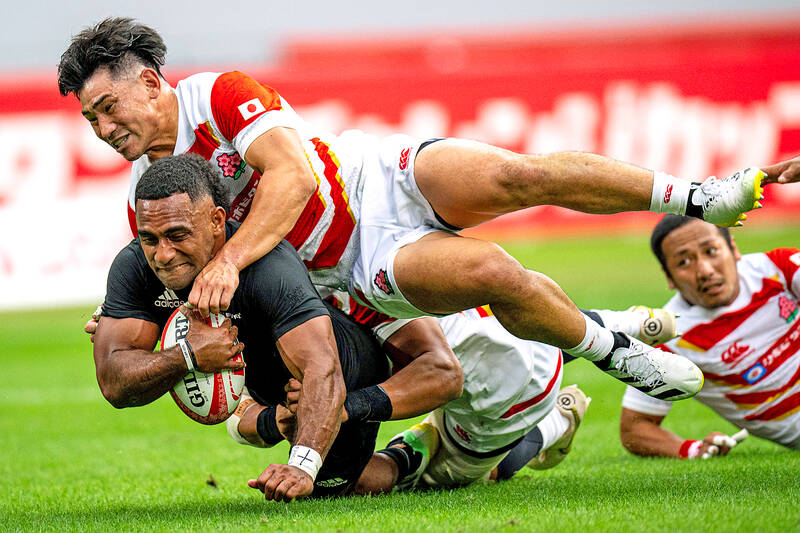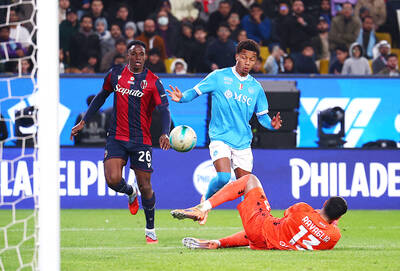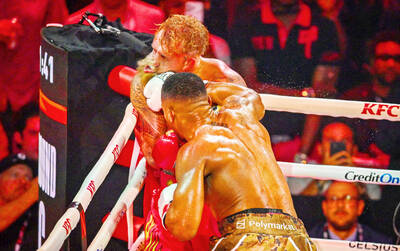The All Blacks and Japan are to play regular Test matches under an agreement signed by the New Zealand and Japanese rugby unions that might also see a faltering first step toward a global club competition.
The memorandum of understanding (MOU) between the unions would see both countries explore opportunities for New Zealand-based Super Rugby franchises to play matches against clubs from the Japan League One professional competition.
Those matches would occur outside the current window for Super Rugby Pacific, which involves Fijian Drua, Moana Pasifika and five clubs each from Australia and New Zealand.

Photo: AFP
A team from Japan and leading franchises from South Africa formerly participated in the Super Rugby competition, but did not return after the COVID-19 pandemic shutdown.
If the club matches in Japan are successful and other countries such as Australia seek to participate, it could provide an early framework for a global club tournament.
In the meantime, the two nations have committed to scheduling more mid-year matches between the New Zealand All Blacks, the Maori All Blacks, the Japan Test team and Japan XV over the next three years.
Three-time Rugby World Cup champions the All Blacks and Japan have met in only five official Test matches since rugby union became professional in 1995, most recently last year when the All Blacks won 38-31.
The New Zealand sevens and women’s teams also are likely to play their Japan counterparts more often.
The Japan women’s team might also be able to play in New Zealand’s provincial and Super Rugby tournaments.
“The MOU provides us with opportunities for our teams in Black, commercial partners and other professional teams and competitions to work more closely together,” New Zealand Rugby chief executive officer Mark Robinson said yesterday.
“The intention is for teams across the spectrum to play more regular matches while also looking at how our men’s and women’s competitions could work together in the longer term,” Robinson said.
Japan Rugby Football Union chairman Kensuke Iwabuchi said he hoped that the agreement would help to grow rugby in Asia.

TOOTHLESS: Bologna never looked like finding a way back, and Antonio Conte and his substitutes were waiting to celebrate long before the final whistle SSC Napoli on Monday lifted the Italian Supercoppa with a 2-0 win over Bologna in Riyadh, David Neres netting both goals to earn the league champions a deserved victory over the toothless Coppa Italia winners. Neres opened the scoring with a stunning strike from distance six minutes before halftime and found the net again in the 57th minute when Bologna were caught trying to play out of defense. “We came here as champions of Italy, we wanted this trophy and we showed it with a great performance,” Napoli forward Matteo Politano told Mediaset. “We could have scored a few more goals, but

Fulham on Monday climbed away from the English Premier League relegation zone and left Nottingham Forest mired in the fight for survival after Raul Jimenez’s penalty sealed a 1-0 win. Marco Silva’s side started the day just two points above fourth-bottom Forest, but Jimenez’s first-half goal at Craven Cottage moved them 10 points clear of the bottom three. While Fulham’s relegation fears were eased heading into the Christmas schedule, Forest are just five points ahead of third-bottom West Ham United in the scrap to avoid crashing into the Championship. Forest had won six of their previous eight games in all competitions, with a

LACKLUSTER FIGHT: At one stage, the referee lost patience with the two fighters, warning them in the fourth round that ‘the fans did not pay to see this crap’ Former world heavyweight champion Anthony Joshua on Friday knocked out YouTuber-turned-boxer Jake Paul in their controversial Netflix-backed bout in Miami. The fight at the Kaseya Center, which saw both men reportedly splitting a mammoth purse of US$184 million, had triggered alarm across boxing due to the gulf in physical size and class between Britain’s two-time former world champion Joshua and Paul, an Internet personality who has forged a lucrative career through a handful of novelty boxing contests. However, in the event, Joshua made hard work of defeating his vastly less accomplished opponent, before his superior size and power eventually told

English Premier League pair Mohamed Salah and Lyle Foster were match-winners on Monday as Egypt and South Africa began their Africa Cup of Nations Group B campaigns with victories in Morocco. Liverpool star Salah struck in the first minute of stoppage-time to snatch a 2-1 win for record seven-time champions Egypt over gallant Zimbabwe in Agadir. Earlier, second-half dominance by one-time title-holders South Africa paid off when Burnley striker Foster netted on 79 minutes to deliver a 2-1 victory over Angola in Marrakesh. The stage is now set for a top-of-the-table showdown between the Pharaohs and Bafana Bafana in Agadir on Friday. They